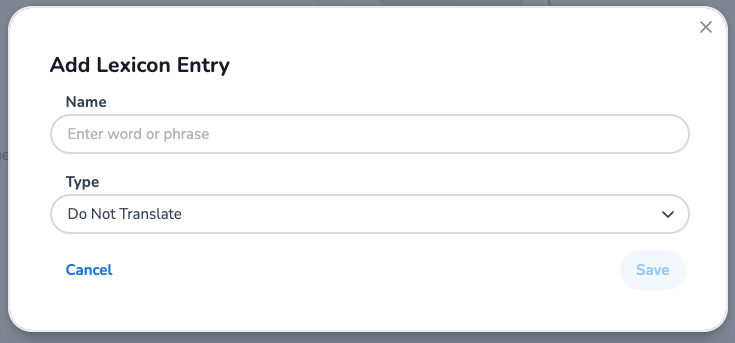The lexicon in HALO is a word management system that allows you to control how specific terms are handled during translation and text-to-speech processing.
By effectively managing your lexicon, you ensure consistent translation and pronunciation across all HALO applications. This leads to improved user experiences and maintains your brand integrity in multilingual environments.
This guide explains how to create and manage lexicon entries effectively and what their function is within HALO.
What is a Lexicon
A lexicon is a collection of words and terms that you can define in your profile to customize how the system handles specific vocabulary. It provides precise control over translation behavior and pronunciation, ensuring that brand names, technical terms, and other special words are processed exactly as intended.
Accessing the Lexicon
You can find the lexicon option in the navigation panel within your profile settings. This feature allows you to maintain consistency across all HALO applications by standardizing how specific terms are translated and pronounced.
Creating and Managing Lexicon Entries
Types of Lexicon Entries
There are four types of lexicon entries you can define:
-
Do Not Translate: Only apply translations without pronunciation changes
-
Alias: A text value that should be pronounced instead of the original text.
-
Spell Out: Spell out the term letter by letter. E.g. the word ‘test’ will be pronounced s "T E S T."
The Alias and Spell Out lexicon entry types are only relevant when using the voice channel since they relate to how words are pronounced. For textual responses these types behave exactly the same as the Do Not Translate lexicon type.
When adding a lexicon entry, translation for that term will always be turned off, independent of the type of the lexicon entry.
Do Not Translate support is only available for text-based channels.
Creating a New Lexicon Entry

Initiate Creation: Click the blue "+" sign to create a new lexicon entry.
Name: Enter the word or term you want to add to the lexicon. This should be the exact text that appears in your content.
Type: Choose how the term should be pronounced:
Value: Provide the specific pronunciation guidance (optional):
-
For Alias: Enter the replacement word or phrase
A few examples are:
|
Name |
Type |
Value |
Result |
|---|---|---|---|
|
Netherlands |
|
|
The word “Netherlands” will never be translated and always shown as “Netherlands” |
|
Test |
|
|
The word ‘test’ will be pronounced s "T E S T." |
|
W3C |
|
|
Every occurrence of W3C will be spoken as "World Wide Web Consortium." |
Managing Your Lexicon
Searching and Filtering
-
Search: Find entries by name, type, or pronunciation value
-
Sort: Organize entries by name, type, translation setting, or creation date
Updating Entries
Modify existing lexicon entries to refine translation and pronunciation settings as your needs evolve.
Removing Entries
Delete lexicon entries that are no longer needed to keep your lexicon organized and relevant.
Benefits of using the Lexicon
Using lexicon in HALO ensures:
-
Brand Consistency: Prevent translation of company names and brand terms
-
Pronunciation Accuracy: Control how technical terms and names are spoken
-
Content Quality: Maintain professional standards across multilingual content
-
User Experience: Deliver natural-sounding speech and accurate translations
Example Usage
Brand Name Protection
Scenario: The term "Conversational AI Cloud" is your brand name that should never be translated.
Solution: Add "Conversational AI Cloud" to lexicon with type Do Not Translate
Pronunciation Override
Scenario: "http://CM.com " should be pronounced as "CM" rather than "C-M dot com"
Solution: Add "http://CM.com " with type Alias and value "CM"
Technical Term Handling
Scenario: Ensure "API" is spelled out as "A-P-I" rather than pronounced as a word
Solution: Add "API" with type Spell Out
Best Practices
-
Regular Review: Periodically review your lexicon entries to ensure they remain relevant
-
Consistent Naming: Use clear, descriptive names for lexicon entries
-
Test Pronunciation: Verify that pronunciation overrides work as expected
-
Team Coordination: Share lexicon standards across your organization for consistency
E-learning Video
For further guidance, watch our e-learning videos:
